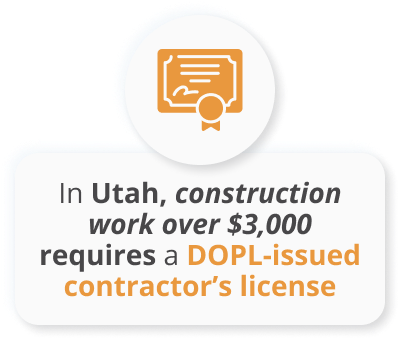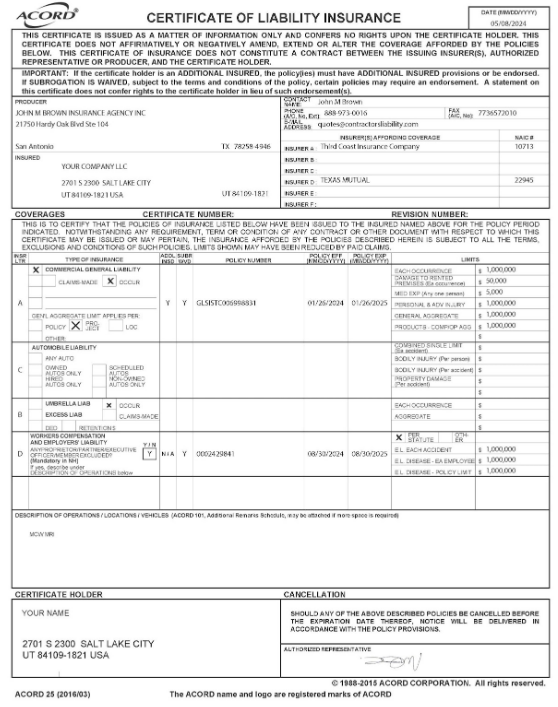In Utah, securing a contractor’s license is essential for anyone looking to operate legally in the state’s construction industry. Whether you’re working on residential projects, commercial developments, or specialized trades, a valid license ensures compliance with state regulations, protects consumers, and upholds industry standards. A contractor’s license not only validates your expertise but also enhances your credibility, making it easier to win contracts and grow your business.

State Overview: General Licensing Requirements
The Utah Division of Occupational and Professional Licensing (DOPL) oversees contractor licensing in Utah. The state mandates that any individual or business performing construction work valued at $3,000 or more must hold a valid contractor’s license. This requirement applies across various classifications, including general contracting, residential/small commercial work, and specialty trades like electrical and plumbing.

General Contractor Classifications in Utah:
- B100: General Contractor
- R100: Residential/Small Commercial Contractor
- E100: General Engineering Contractor
- P200: General Plumbing Contractor
- P201: Residential Plumbing Contractor
- E200: General Electrical Contractor
- E201: Residential Electrical Contractor
For each classification, contractors must meet specific experience, examination, and educational requirements to qualify for licensure.
City and County-Specific Requirements
While Utah’s contractor licensing is regulated at the state level, certain cities and counties may have additional requirements, particularly for large-scale or specialized projects. Here are a few examples:
- Salt Lake City: As Utah’s largest city, Salt Lake City often has stricter building codes and permit requirements, especially for commercial developments. Contractors may need to obtain additional local permits and pass city-specific inspections.
- Provo: Contractors may encounter specific zoning regulations in Provo, particularly in residential areas experiencing significant growth. For detailed local requirements, consult the Provo City Development Services Department.
- Park City: Known for its luxury properties and challenging terrain, Park City may impose additional environmental and safety regulations, especially for projects involving slope stability or winter conditions.
Licensing Process Breakdown: From Application to Approval

Determine Your License Classification
- Identify the appropriate classification for your work (e.g., General Contractor, Residential Contractor, or Specialty Trade license).

Meet the Experience and Educational Requirements
- Accumulate at least two years (4,000 hours) of verifiable experience in the construction industry.
- Additional ways to meet the experience requirement include qualifying for a current or previous Utah Contractor License.
- Holding a Construction Management Degree, being a Licensed Utah Professional Engineer, or having passed the NASCLA Examination for Commercial General Building Contractors.

Pass the Required Exams
- Complete the Utah Business & Law Exam through an authorized provider. Alternatively, one year of licensed experience in another state, district, or U.S. territory, or being a qualifier on a Utah Contractor License prior to May 9, 2017, can fulfill this requirement.

Submit Your Application
- Complete the contractor license application form provided by DOPL.
- Pay the required application fees.

Obtain the Necessary Insurance and Bonds
- Secure general liability insurance and, if applicable, workers’ compensation insurance.
- Post a surety bond as required by DOPL, which is a financial guarantee for compliance with state regulations.

Receive Your License
- Once your application is approved and all requirements are met, DOPL will issue your contractor’s license, allowing you to operate legally in Utah.
Insurance and Bonding Requirements
To obtain a contractor’s license in Utah, you must meet specific insurance and bonding requirements that protect both your business and your clients:
- General Liability Insurance: This is mandatory for all licensed contractors and provides coverage for potential damages or injuries on the job.
- Policy Limits: The required coverage amount can vary based on the contractor’s classification and the size of the projects they undertake. Typically, contractors may need coverage ranging from $100,000 to several million dollars per occurrence.
- Workers’ Compensation Insurance: This insurance is required if you have employees. It covers medical expenses and lost wages for work-related injuries.
- Exemptions: Sole proprietors and independent contractors without employees may be exempt from carrying workers’ compensation insurance, but it’s important to confirm your specific situation with the Utah Division of Occupational and Professional Licensing (DOPL).
- Surety Bond: Contractors must secure a surety bond, with the amount determined by DOPL based on the type of license and the scope of work.
- Surety Bond Providers: Contractors typically obtain surety bonds from surety companies, which evaluate the contractor’s creditworthiness and business history before issuing the bond. The cost of the bond is usually a small percentage of the total bond amount.

Specialty Contractor Licensing
Utah offers specialty contractor licenses for trades like electrical, plumbing, and HVAC. Each specialty has its own requirements:

Electrical Contractors
The qualifier must be a Master Electrician. This requires significant hands-on experience, typically gained through an apprenticeship or as a journeyman, and passing a rigorous exam that covers the National Electrical Code (NEC) and Utah-specific regulations.

Plumbing Contractors
Must have a Master Plumber as the qualifier. Applicants need extensive experience, usually through an apprenticeship, and must pass a state-administered exam focused on plumbing systems, state codes, and safety practices. Special endorsements are available for specific areas like gas piping or backflow prevention.

HVAC Contractors
Need a combination of formal education and practical experience in heating, ventilation, and air conditioning systems. After meeting these requirements, contractors must pass an exam that tests their knowledge of system design, installation, maintenance, and relevant Utah regulations.
These specialty licenses ensure that contractors have the necessary expertise to perform highly technical and safety-critical work.
Obtaining a contractor’s license in Utah is crucial for operating legally and successfully in the state’s construction industry. By meeting the state’s licensing requirements, securing the necessary insurance and bonds, and staying informed about local regulations, you can build a strong, reputable contracting business in Utah.
Consult the Utah Division of Occupational and Professional Licensing (DOPL) for more detailed information on licensing and to stay updated on any changes.
Frequently Asked Questions (FAQ)
These are common questions about General Contractor License in Utah.
Utah offers various contractor licenses, including General Contractor, Residential Contractor, Electrical Contractor, Plumbing Contractor, and HVAC Contractor. Each license type has specific requirements and classifications.
The license you need depends on the type of work you plan to perform. For example, if you’re involved in building and construction, you may need a General or Residential Contractor license. For specialized trades like electrical or plumbing work, you’ll need the respective specialty license.
Experience requirements vary by license type. For example, a General Building Contractor license typically requires four years of verifiable work experience. Specialty licenses like electrical or plumbing may also require a specific number of years in the trade and completion of an apprenticeship.
Yes, most contractor licenses in Utah require passing a state-administered exam. This includes the Utah Contractor Business and Law Exam and any trade-specific exams related to your field of work.
After meeting the experience and educational requirements and passing the required exams, you need to submit a completed application to the Utah Department of Occupational and Professional Licensing (DOPL). Your application should include all necessary documentation, such as proof of experience, exam scores, and the required fees.
Yes, Utah requires contractors to carry general liability insurance. The coverage amount depends on the type of license and the scope of your work. Workers’ compensation insurance is also required if you have employees.

